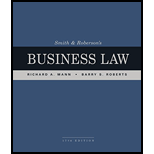
To explain: Types of contracts that might violate a statute and distinguish two types of licensing statutes.
Explanation of Solution
Licensing statute: A statute requiring a person or business to obtain a government license before they engage in a specified occupation or activity.
- Regulatory license: It is a mechanism designed to protect the public against unqualified individuals, ordinarily a person cannot qualify for professional services unless he has the requisite regulatory license.
- Revenue license: In comparison, a revenue license is given to raise money, deals are enforceable for unlicensed services.
Gambling statutes: Contracts found violating a gambling statute are void. Insurance policies do not come under gambling laws except where the person taking the policy has no insurable interest in insuring the property or the individual. Given the element of chance involved in deciding the future price, so-called futures contracts are not considered gambling.
Usury statutes: Laws establishing a maximum allowable interest rate for which a lender and money borrower may contract. A lender who violates a usury statute can forfeit both the principal and interest, only the interest, or the interest that exceeds the limit allowed. In some jurisdictions the amount forfeited is a multiple of the interest charged.
Sunday statutes: Common law does not prohibit concluding Sunday contracts. Some states have legislation, blue laws, which amend this common law rule and on Sunday prohibits certain types of commercial activity. Blue laws do not usually extend to “need” and “charity” activities.
Want to see more full solutions like this?
Chapter 13 Solutions
Smith and Roberson’s Business Law
- Moulton Cavity & Mold, Inc., agreed to manufacture twenty-six innersole molds to be purchased by Lyn-Flex. Moulton delivered the twenty-six molds to Lyn-Flex after Lyn-Flex allegedly approved the sample molds. However, Lyn-Flex rejected the molds, claiming that the molds did not satisfy the specifications exactly, and denied that it had ever approved the sample molds. Moulton then sued, contending that Lyn-Flex wrongfully rejected the molds. Lyn-Flex argued that the Code’s perfect tender rule permitted its rejection of the imperfect molds, regardless of Moulton’s substantial performance. Decision?arrow_forwardOutline and discuss the effect of exclusion clausesarrow_forwardIdentify and explain the limitations on contractual remedies.arrow_forward
- Deborah McCullough bought a new car from Bill Swad Chrysler, Inc. The car was protected by both a limited warranty and an extended warranty. McCullough immediately encountered problems with the automobile’s brakes, transmission, and air conditioning and discovered a number of cosmetic defects as well. She returned the car to Swad for repairs, but Swad did not fix the brakes properly or perform any of the cosmetic work. Moreover, new problems appeared with respect to the car’s steering mechanism. McCullough returned the car twice more for repairs, but on each occasion, old problems persisted and new ones emerged. After the engine abruptly shut off on a short trip away from home and the brakes again failed on a more extensive excursion, McCullough presented Swad with a list of thirty-two of the car’s defects and demanded their correction. When Swad failed to remedy more than a few of the problems, McCullough wrote a letter to Swad calling for rescission of the purchase agreement and a…arrow_forwardIn Oliver V. Brock, what factors did the court consider most significant in determining whether Dr. Brock had a contractual relationship with Oliver?arrow_forward. Discuss The Factors Taken Into Consideration In Determining Whether The Legislator Implicitly Intended The Contract To Be Void For Statutory Illegality?arrow_forward
- Rensselaer Water Company contracted with the city of Rensselaer to provide water to the city for use in homes, public buildings, industry, and fire hydrants. During the term of the contract, a building caught fire. The fire spread to a nearby warehouse and destroyed it and its contents. The water company knew of the fire but failed to supply adequate water pressure at the fire hydrant to extinguish the fire. The warehouse owner sued the water company for failure to fulfill its contract with the city. Can the warehouse owner enforce the contract? Explain.arrow_forwardExpress and imply terms of contractarrow_forwardIdentify and explain the goods-oriented remedies of the seller and the buyer.arrow_forward
- Melodee Lane Lingerie Co. was a tenant in a building that was protected against fire by a sprinkler and alarm system maintained by the ADT security company. Because of the latter's fault, the controls on the system were defective and allowed the discharge of water into the building, which damaged Melodee's property. When Melodee sued ADT, its defense was that its service contract limited its liability to 10% of the annual service charge made to the customer. Was this limitation valid? [Melodee Lane Lingerie Co. v. American District Telegraph Co., 218 N.E.2d 661 (N.Y.)]arrow_forwardWhat are the rights of an unpaid seller against the goods, as per the Sale of Goods Act?arrow_forwardDiscuss the legal principles surrounding misrepresentation in contract law.arrow_forward
 Understanding BusinessManagementISBN:9781259929434Author:William NickelsPublisher:McGraw-Hill Education
Understanding BusinessManagementISBN:9781259929434Author:William NickelsPublisher:McGraw-Hill Education Management (14th Edition)ManagementISBN:9780134527604Author:Stephen P. Robbins, Mary A. CoulterPublisher:PEARSON
Management (14th Edition)ManagementISBN:9780134527604Author:Stephen P. Robbins, Mary A. CoulterPublisher:PEARSON Spreadsheet Modeling & Decision Analysis: A Pract...ManagementISBN:9781305947412Author:Cliff RagsdalePublisher:Cengage Learning
Spreadsheet Modeling & Decision Analysis: A Pract...ManagementISBN:9781305947412Author:Cliff RagsdalePublisher:Cengage Learning Management Information Systems: Managing The Digi...ManagementISBN:9780135191798Author:Kenneth C. Laudon, Jane P. LaudonPublisher:PEARSON
Management Information Systems: Managing The Digi...ManagementISBN:9780135191798Author:Kenneth C. Laudon, Jane P. LaudonPublisher:PEARSON Business Essentials (12th Edition) (What's New in...ManagementISBN:9780134728391Author:Ronald J. Ebert, Ricky W. GriffinPublisher:PEARSON
Business Essentials (12th Edition) (What's New in...ManagementISBN:9780134728391Author:Ronald J. Ebert, Ricky W. GriffinPublisher:PEARSON Fundamentals of Management (10th Edition)ManagementISBN:9780134237473Author:Stephen P. Robbins, Mary A. Coulter, David A. De CenzoPublisher:PEARSON
Fundamentals of Management (10th Edition)ManagementISBN:9780134237473Author:Stephen P. Robbins, Mary A. Coulter, David A. De CenzoPublisher:PEARSON





